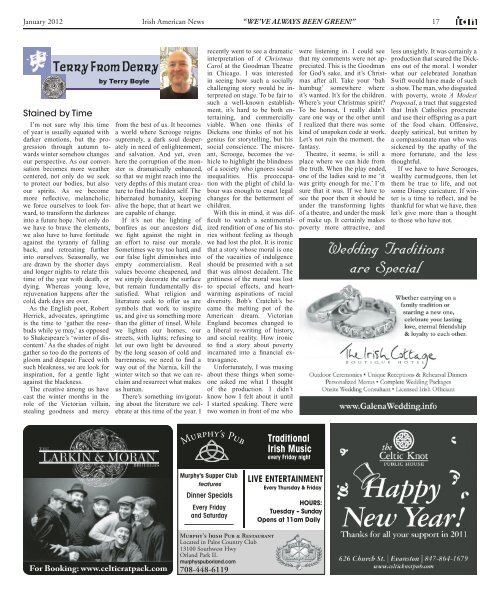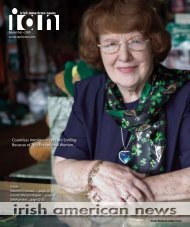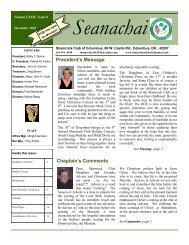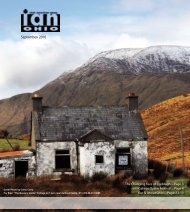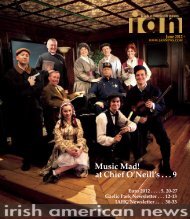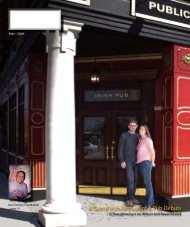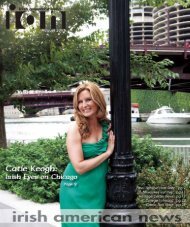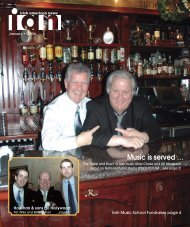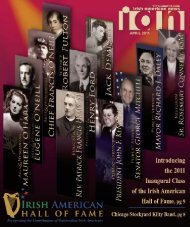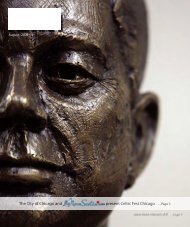Flogging Molly - Irish American News
Flogging Molly - Irish American News
Flogging Molly - Irish American News
You also want an ePaper? Increase the reach of your titles
YUMPU automatically turns print PDFs into web optimized ePapers that Google loves.
January 2012 <strong>Irish</strong> <strong>American</strong> <strong>News</strong> “We’ve Always Been Green!” 17<br />
Terry From Derry<br />
Stained by Time<br />
I’m not sure why this time<br />
of year is usually equated with<br />
darker emotions, but the progression<br />
through autumn towards<br />
winter somehow changes<br />
our perspective. As our conversation<br />
becomes more weather<br />
centered, not only do we seek<br />
to protect our bodies, but also<br />
our spirits. As we become<br />
more reflective, melancholic,<br />
we force ourselves to look forward,<br />
to transform the darkness<br />
into a future hope. Not only do<br />
we have to brave the elements,<br />
we also have to have fortitude<br />
against the tyranny of falling<br />
back, and retreating further<br />
into ourselves. Seasonally, we<br />
are drawn by the shorter days<br />
and longer nights to relate this<br />
time of the year with death, or<br />
dying. Whereas young love,<br />
rejuvenation happens after the<br />
cold, dark days are over.<br />
As the English poet, Robert<br />
Herrick, advocates, springtime<br />
is the time to ‘gather the rosebuds<br />
while ye may,’ as opposed<br />
to Shakespeare’s ‘winter of discontent.’<br />
As the shades of night<br />
gather so too do the portents of<br />
gloom and despair. Faced with<br />
such bleakness, we are look for<br />
inspiration, for a gentle light<br />
against the blackness.<br />
The creative among us have<br />
cast the winter months in the<br />
role of the Victorian villain,<br />
stealing goodness and mercy<br />
by Terry Boyle<br />
from the best of us. It becomes<br />
a world where Scrooge reigns<br />
supremely, a dark soul desperately<br />
in need of enlightenment,<br />
and salvation. And yet, even<br />
here the corruption of the monster<br />
is dramatically enhanced,<br />
so that we might reach into the<br />
very depths of this mutant creature<br />
to find the hidden self. The<br />
hibernated humanity, keeping<br />
alive the hope, that at heart we<br />
are capable of change.<br />
If it’s not the lighting of<br />
bonfires as our ancestors did,<br />
we fight against the night in<br />
an effort to raise our morale.<br />
Sometimes we try too hard, and<br />
our false light diminishes into<br />
empty commercialism. Real<br />
values become cheapened, and<br />
we simply decorate the surface<br />
but remain fundamentally dissatisfied.<br />
What religion and<br />
literature seek to offer us are<br />
symbols that work to inspire<br />
us, and give us something more<br />
than the glitter of tinsel. While<br />
we lighten our homes, our<br />
streets, with lights; refusing to<br />
let our own light be devoured<br />
by the long season of cold and<br />
barrenness, we need to find a<br />
way out of the Narnia, kill the<br />
winter witch so that we can reclaim<br />
and resurrect what makes<br />
us human.<br />
There’s something invigorating<br />
about the literature we celebrate<br />
at this time of the year. I<br />
recently went to see a dramatic<br />
interpretation of A Christmas<br />
Carol at the Goodman Theatre<br />
in Chicago. I was interested<br />
in seeing how such a socially<br />
challenging story would be interpreted<br />
on stage. To be fair to<br />
such a well-known establishment,<br />
it’s hard to be both entertaining,<br />
and commercially<br />
viable. When one thinks of<br />
Dickens one thinks of not his<br />
genius for storytelling, but his<br />
social conscience. The miscreant,<br />
Scrooge, becomes the vehicle<br />
to highlight the blindness<br />
of a society who ignores social<br />
inequalities. His preoccupation<br />
with the plight of child labour<br />
was enough to enact legal<br />
changes for the betterment of<br />
children.<br />
With this in mind, it was difficult<br />
to watch a sentimentalized<br />
rendition of one of his stories<br />
without feeling as though<br />
we had lost the plot. It is ironic<br />
that a story whose moral is one<br />
of the vacuities of indulgence<br />
should be presented with a set<br />
that was almost decadent. The<br />
grittiness of the moral was lost<br />
to special effects, and heartwarming<br />
aspirations of racial<br />
diversity. Bob’s Cratchit’s became<br />
the melting pot of the<br />
<strong>American</strong> dream. Victorian<br />
England becomes changed to<br />
a liberal re-writing of history,<br />
and social reality. How ironic<br />
to find a story about poverty<br />
incarnated into a financial extravagance.<br />
Unfortunately, I was musing<br />
about these things when someone<br />
asked me what I thought<br />
of the production. I didn’t<br />
know how I felt about it until<br />
I started speaking. There were<br />
two women in front of me who<br />
were listening in. I could see<br />
that my comments were not appreciated.<br />
This is the Goodman<br />
for God’s sake, and it’s Christmas<br />
after all. Take your ‘bah<br />
humbug’ somewhere where<br />
it’s wanted. It’s for the children.<br />
Where’s your Christmas spirit?<br />
To be honest, I really didn’t<br />
care one way or the other until<br />
I realized that there was some<br />
kind of unspoken code at work.<br />
Let’s not ruin the moment, the<br />
fantasy.<br />
Theatre, it seems, is still a<br />
place where we can hide from<br />
the truth. When the play ended,<br />
one of the ladies said to me ‘it<br />
was gritty enough for me.’ I’m<br />
sure that it was. If we have to<br />
see the poor then it should be<br />
under the transforming lights<br />
of a theatre, and under the mask<br />
of make up. It certainly makes<br />
poverty more attractive, and<br />
less unsightly. It was certainly a<br />
production that scared the Dickens<br />
out of the moral. I wonder<br />
what our celebrated Jonathan<br />
Swift would have made of such<br />
a show. The man, who disgusted<br />
with poverty, wrote A Modest<br />
Proposal, a tract that suggested<br />
that <strong>Irish</strong> Catholics procreate<br />
and use their offspring as a part<br />
of the food chain. Offensive,<br />
deeply satirical, but written by<br />
a compassionate man who was<br />
sickened by the apathy of the<br />
more fortunate, and the less<br />
thoughtful.<br />
If we have to have Scrooges,<br />
wealthy curmudgeons, then let<br />
them be true to life, and not<br />
some Disney caricature. If winter<br />
is a time to reflect, and be<br />
thankful for what we have, then<br />
let’s give more than a thought<br />
to those who have not.<br />
For Booking: www.celticratpack.com


